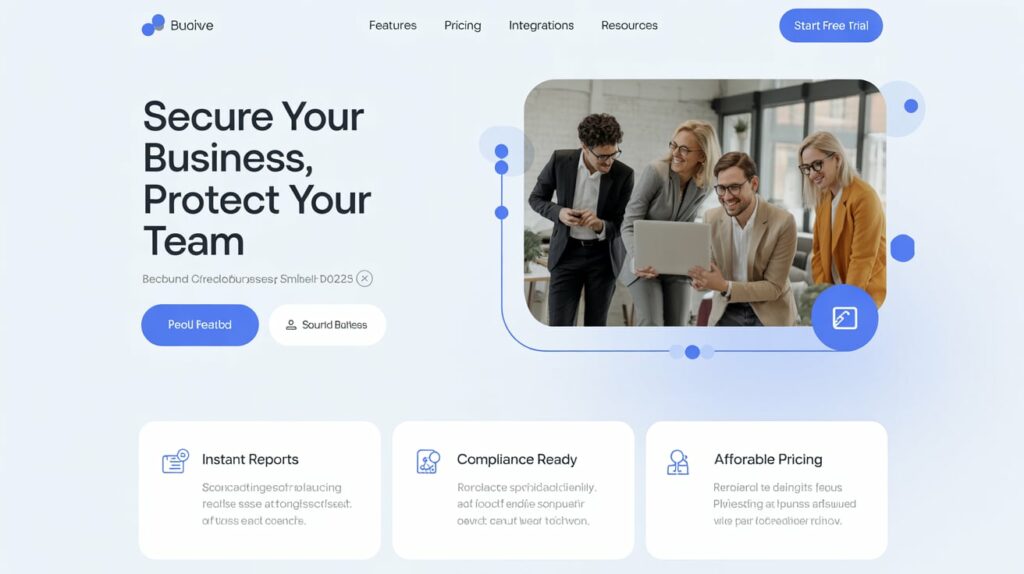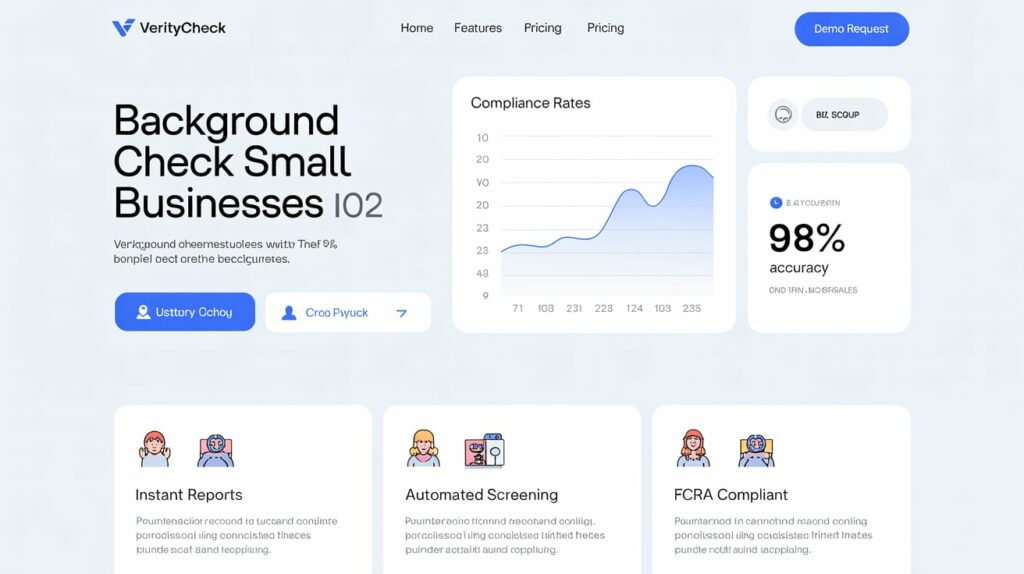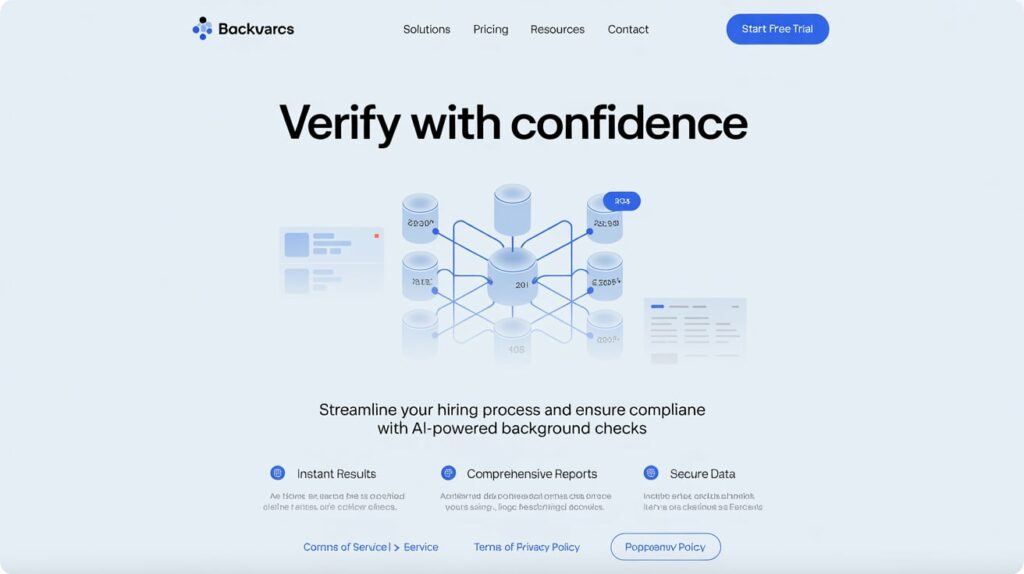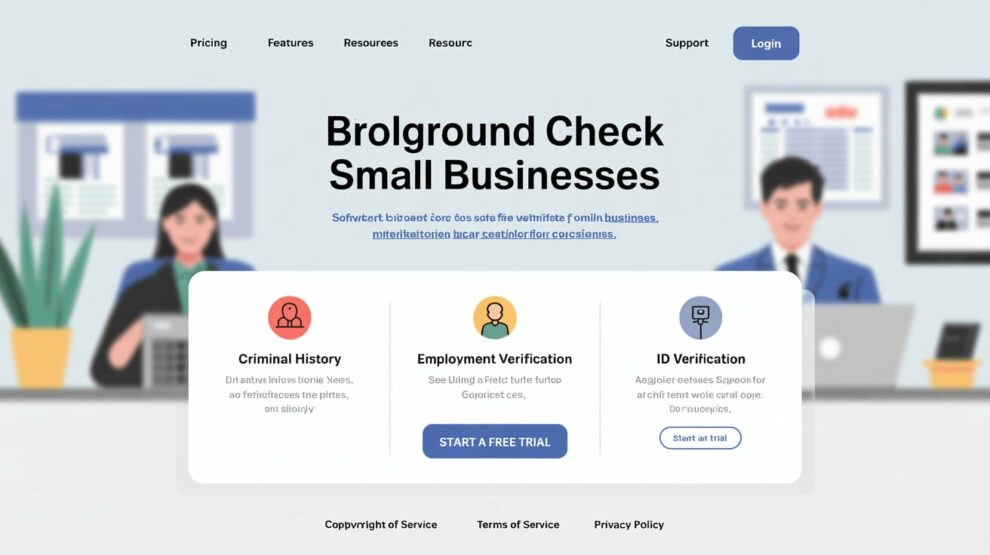Hire Smarter, Safer, and Faster: The Best Background Check Software for Small Businesses in 2025
Table of Contents
Running a small business in 2025 means navigating a competitive and fast-paced environment where making smart hiring decisions is more critical than ever. One key tool that helps business owners protect their company and build a reliable team is background check software. These digital solutions allow small businesses to quickly and efficiently verify the history of potential employees, ensuring that they hire trustworthy candidates and minimize risks related to fraud, theft, or workplace safety.
With advancements in technology and stricter compliance regulations, background check software in 2025 has become more affordable, user-friendly, and integrated with other HR tools. Whether you’re hiring your first employee or growing your team, background check software can be a game changer for your business.
Why Small Businesses Need Background Check Software
Small businesses often don’t have the resources for lengthy manual background checks or the budget for third-party services that charge per check. Background check software automates this process, providing faster results with greater accuracy. It also helps businesses stay compliant with employment laws such as the Fair Credit Reporting Act (FCRA), protecting both the employer and candidate rights.
Modern software solutions can screen criminal records, employment history, education verification, and even social media activity — all within minutes. Plus, many platforms offer cloud-based services, making it easy to manage checks from anywhere, on any device.
The Importance of Background Check Software for Small Businesses

Small businesses operate with limited resources—whether it’s time, staff, or budget. A single hiring mistake can have disproportionately large consequences. For example, a dishonest hire could lead to theft, while someone with a history of workplace violence could endanger employees and customers. Background check software minimizes these risks by verifying important candidate information.
Key Benefits:
- Risk Mitigation: You can avoid hiring someone with a criminal background that’s incompatible with your industry (e.g., someone with a theft record for a cashier role).
- Workplace Safety: Verifying past behavior helps protect employees and create a safe working environment.
- Enhanced Reputation: Customers and employees trust businesses that prioritize ethical hiring.
- Time & Cost Savings: Automated software reduces time spent manually verifying candidates and helps avoid turnover-related costs from bad hires.
Key Features to Look for in Background Check Software
When evaluating background check platforms, these are the essential features that make the software reliable, efficient, and legally sound:
Comprehensive Screening Options
Choose platforms that offer more than just criminal background checks. A well-rounded system can verify:
User-Friendly Interface
A simple, intuitive dashboard is vital, especially if you don’t have a full-time HR department. You should be able to:
- Upload candidate info
- Request checks in one click
- View results quickly
- Easily understand reports
Fast Turnaround Time
Delays in hiring can result in lost opportunities. Many platforms now use digital databases and AI to generate reports within:
- Minutes for identity or basic checks
- 24–72 hours for comprehensive checks
Fast processing helps you stay competitive in hiring.
Compliance Tools
Legal compliance is critical. Look for features like:
- Pre-built consent forms and disclosures
- Automated “adverse action” notices (if you deny a job based on the report)
- Audit trails and logs for legal verification
These features help you comply with the FCRA and reduce legal risks.
Integration Capabilities
Seamless integrations with your:
- ATS (Applicant Tracking System) – for smoother candidate evaluation
- HRMS (HR Management Systems) – for easier onboarding
- Payroll Software – to simplify employee transitions
Integration avoids data duplication and manual errors.
Secure Data Handling
You’re dealing with sensitive candidate information. Make sure the software follows:
- Data encryption standards (at rest and in transit)
- GDPR/CCPA compliance
- Secure user authentication (2FA, role-based access control)
- Clear data retention and deletion policies
How Background Check Software Can Enhance Hiring Practices

Modern hiring is about more than resumes—it’s about reliability, fit, and long-term value. Background check software helps elevate your hiring practices in the following ways:
- Reduce Turnover
Hiring someone who misrepresented their experience or had behavioral red flags can lead to quick departures or firings. Verifying their claims helps ensure you’re bringing on the right person the first time. - Increase Workplace Safety
Background checks flag violent or illegal behavior that may put other employees or customers at risk, particularly in sensitive roles like childcare, healthcare, or finance. - Improve Hiring Speed
Automated checks allow small businesses to vet applicants quickly, improving time-to-hire and reducing bottlenecks—essential in competitive labor markets. - Standardize Screening
Manual checks can be inconsistent and subjective. Software-based screening ensures every applicant is evaluated using the same process, reducing unconscious bias and supporting fair hiring. - Build Employer Brand
Candidates want to work for reputable businesses. A consistent, respectful, and thorough screening process shows professionalism and builds your image as a quality employer.
Comparing the Cost-Effectiveness of Different Background Check Solutions
For small businesses, affordability and ROI are key. Here’s a breakdown of common pricing models and how to decide what’s best for your company:
- Pay-Per-Check Model
- Best for: Businesses that hire infrequently.
- You pay a flat fee for each background check (e.g., $25–$60 per check).
- Pros: No ongoing commitment.
- Cons: Cost can add up with frequent hiring.
- Subscription Plans
- Best for: Companies hiring regularly.
- Monthly or annual subscription includes a set number of checks.
- Pros: Predictable costs, usually cheaper per check.
- Cons: You pay even if you don’t use all the checks.
- Tiered Pricing
- Different tiers may offer varying levels of detail.
- Basic Tier: Identity and criminal checks.
- Premium Tier: Includes employment/education verification, drug tests.
- Pros: Flexibility to choose based on role.
- Cons: Can be confusing without guidance.
- Free Trials and Discounts
- Some providers offer trial periods, discounts for small teams, or non-profit pricing.
- Always test usability and support before committing.
Cost Effectiveness Tip: Don’t choose the cheapest option blindly. Consider long-term value, legal coverage, turnaround time, and data accuracy—especially if a bad hire could cost thousands in damages.
Legal Considerations When Using Background Check Software in Recruitment

Compliance is non-negotiable. Here are the main laws and best practices you must follow:
- Fair Credit Reporting Act (FCRA) Compliance (U.S.)
If you use a third-party screening company, the FCRA requires:- Written Disclosure and Authorization from the candidate before running a check.
- Pre-Adverse Action Notice if something negative appears.
- Copy of Report + Summary of Rights must be shared.
- Final Adverse Action Notice if you decide not to hire them.
- State and Local Laws
Examples include:- Ban the Box laws: Delay criminal history questions until later in the process.
- Salary History Bans: You can’t ask about previous salaries in some jurisdictions.
- Always consult local rules before screening.
- Privacy and Data Security
Candidate information is highly sensitive. You must comply with:- GDPR (if operating in the EU)
- CCPA (if based in or serving California)
- Store and dispose of data securely
- Provide candidates access to their data if requested
- Non-Discrimination Practices
- Apply checks fairly across all applicants.
- Don’t use background info to unlawfully discriminate (race, religion, gender, etc.).
- Comply with EEOC guidelines on equal opportunity.
- Record Retention Requirements
- FCRA: Keep consent and decision records for at least 1–2 years.
- Some industries (e.g., healthcare or finance) may require longer retention.
- Secure digital storage is recommended.
Frequently Asked Questions (FAQs)
1. What types of background checks can small business software perform in 2025?
Most background check software for small businesses in 2025 offers comprehensive screening options, including criminal record checks, identity verification, employment history, education verification, drug testing records, and credit checks (where legally permitted). Some software also includes social media and reputation analysis.
2. How much does background check software typically cost for small businesses?
Pricing varies depending on the provider and the number of checks required. Many software options offer subscription plans starting around $20 to $50 per month, with pay-per-check fees ranging from $15 to $60. There are also scalable plans to fit small businesses that perform background checks infrequently or in higher volumes.
3. Is background check software compliant with privacy and employment laws?
Yes, reputable background check software providers comply with federal and state laws, including the Fair Credit Reporting Act (FCRA). They usually include built-in compliance tools such as candidate consent forms, adverse action notices, and record retention policies to ensure your hiring process stays legal and ethical.
4. How easy is it to integrate background check software with other HR tools?
Most background check platforms in 2025 offer seamless integration with popular HR management systems (HRMS), applicant tracking systems (ATS), and payroll software. This integration helps streamline hiring workflows, automate background screening triggers, and maintain organized records without extra manual effort.
Conclusion
In 2025, background check software has become an essential asset for small businesses looking to hire with confidence and reduce risks. By leveraging these modern tools, small business owners can protect their workplace, enhance hiring efficiency, and stay compliant with complex legal requirements.
When selecting a background check solution, focus on software that offers comprehensive features, strong compliance support, fast turnaround, and cost-effective pricing. This investment not only safeguards your business but also builds a trustworthy, high-performing team, laying a solid foundation for sustainable growth.
For small businesses ready to thrive in today’s competitive marketplace, adopting background check software isn’t just a choice — it’s a smart business necessity.
Do Follow Dragcast on Social Media For More Such Content.












Add Comment